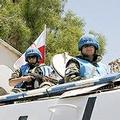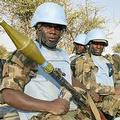 聯合國軍事與民生援助專家於3月12日在奈洛比一場會議上表示,「聯合國維持和平行動在森林與水等自然資源方面採取的工作,影響層面不僅及於爭戰國家的自然環境而已,就連維和任務的效率也受到了影響。」該會議由聯合國環境規劃署與國際紅十字會召集而成,目的是要保護爭戰國家的自然環境。
聯合國軍事與民生援助專家於3月12日在奈洛比一場會議上表示,「聯合國維持和平行動在森林與水等自然資源方面採取的工作,影響層面不僅及於爭戰國家的自然環境而已,就連維和任務的效率也受到了影響。」該會議由聯合國環境規劃署與國際紅十字會召集而成,目的是要保護爭戰國家的自然環境。
根據聯合國統計,2008年2月底時有90,605名聯合國維和部隊分散在120個國家,擔任軍隊、警察與軍事觀察員等角色,持續在全球進行20項左右的任務。聯合國後衝突評估報告(post-conflict assessments)指出,「為了因應和平部活動所需,而在一些脆弱性環境引起的相關問題相當嚴重,包括建設用木材、軍隊所需的飲用水和牲畜等等層面,都造成不少問題。」
然而專家在會議中說道,「如果採行永續採購政策,國際社群將能在永續維和與救援工作方面投入更多貢獻。」聯合國環境規劃署執行長史坦納(Achim Steiner)表示:「較好的計劃與管理措施不僅能減少需求,更能進一步讓衝突地區的整體經濟、和平建構及國家發展上有所展望。」
 史坦納說道:「維和行動與救援機構扮演的主要角色就是維持和平,並提供支援給處於急難時期的脆弱社群。但同時維和行動也有責任確保其進駐與行動產生最微小的生態足跡,不會讓可能已飽受戰爭蹂躪的環境加重惡化。」
史坦納說道:「維和行動與救援機構扮演的主要角色就是維持和平,並提供支援給處於急難時期的脆弱社群。但同時維和行動也有責任確保其進駐與行動產生最微小的生態足跡,不會讓可能已飽受戰爭蹂躪的環境加重惡化。」
這場會議是由聯合國環境規劃署主辦,瑞典國防研究局、聯合國戰地支援部、聯合國駐蘇丹部隊及環境法律研究院(Environmental Law Institute)協辦,目的是關心如何將永續行動的實踐與和平及救援任務結合在一起。其中包含研發新科技以確保水及能源效率,或是替代的建築技術來減少砍伐森林。
史坦納表示,「人們越來越意識到有必要採取行動,而找出方法來保護衝突國家的自然環境與長期生活物資,也越來越迫切。」
史坦納表示,「一些機構已在前方開路,而為了推廣這個重要的議題,一定要建立起良好的實踐案例。」
The impact of United Nations peacekeeping operations on natural resources such as wood and water can affect not only the environment of countries in conflict but the effectiveness of the peacekeeping missions themselves, military and civilian aid experts said today in Nairobi.
Convened by the UN Environment Programme and the International Committee of the Red Cross, the workshop focused on the protection of the environment during conflict.
At the end of February, there were 90,605 UN peacekeepers serving as troops, police or military observers in 20 missions around the world, according to UN statistics, with 120 countries contributing uniformed personnel.
UN post-conflict assessments indicate that the stress placed on vulnerable environments by the needs of peacekeepers can be severe, from the timber used for construction and to drinking water and livestock for feeding the troops.
Yet, experts told the meeting that by adopting sustainable procurement policies the international community can make a major contribution to more sustainable peacekeeping and relief operations.
Better planning and management practices could reduce demand and even contribute to overall recovery, peacebuilding and development prospects in crisis-affected regions, says UNEP Executive Director Achim Steiner.
"The primary role of international peacekeeping forces and aid agencies is to keep the peace and support vulnerable communities during difficult and distressing times. But they also have the responsibility to ensure that their presence and operations have a minimal ecological footprint and do not aggravate environmental degradation, which may be a dimension of the conflict," said Steiner.
The meeting, hosted by UNEP and co-organized by the Swedish Defence Research Agency, the UN Department of Field Support, the UN Mission in Sudan, and the Environmental Law Institute, looked at ways to integrate sustainable practices into peacekeeping and relief operations.
These include new technologies to ensure water and energy efficiency, or alternative construction techniques to minimize deforestation.
"There is a growing awareness of the need for action," said Steiner, "and momentum is now building to find ways of protecting the environment and the long-term livelihoods of affected communities."
"Some agencies are already leading the way. Their examples of good practice must be built upon to promote this important agenda," he said.



